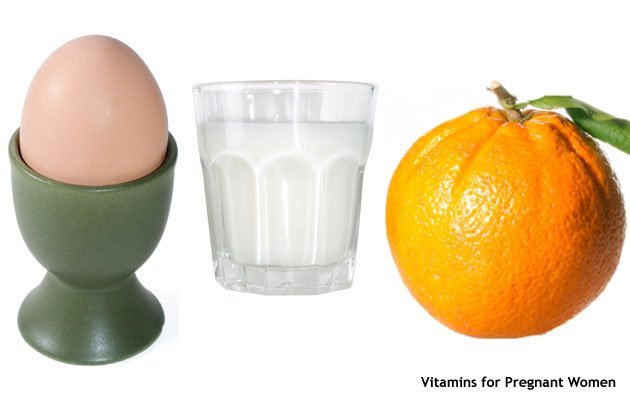Nutrition is a vital aspect of pregnancy. Intake of foods rich in their dietary values is important as the same food feeds the baby in the womb. While all types of nutrients have a niche role to play in the development of the baby, vitamins in the diet of an expecting mother have their own share of significance.

Vitamins for Pregnant Women:
Vitamin A: The development of vital organs of the embryo depends on the intake of at least 770 micrograms of this vitamin on a daily basis. The organs developed by this nutrient are the heart, lungs, eyes, kidneys, and bones. The central nervous system, respiratory and circulatory systems also develop by using this vitamin. It is found in foods like eggs, milk, potatoes, pumpkin, leafy vegetables and cantaloupe.
Vitamin C: It helps in strengthening the immune system and protects the body from tissue damage. 80 -85 mg of this vitamin should be provided to the body through the rich sources like beans, papaya, potatoes, tomatoes and citrus fruits.
Vitamin D: 5 micrograms of this nutrient should be present in the diet of an expecting mother. This vitamin strengthens the bones and teeth of the developing baby in the first few months of embryonic development. It does so by regulating the presence of calcium and phosphate in the body. Sunlight is the best natural source of this nutrient.
Vitamin E: The red blood cells and muscles of the baby develop by using this vitamin. The recommended dietary allowance or intake of Vitamin E for a pregnant woman is 15 mg. Some of the important food sources of it are spinach, nuts, wheats and cereals.
Thiamin: Its other name is Vitamin B1. It regulates the nervous system and provides enough energy to the pregnant woman all through the day. The recommended amount of its intake during childbirth is 1.5 mg. Pasta, nuts, porks, berries, whole grain and rice are the important natural sources of it.
Riboflavin: It helps in the development of good eyesight and skin of the baby. Its other name is Vitamin B2. A pregnant woman must take 1.4 mg of this nutrient on a daily basis from foods like fish, eggs, meat and cereals.
Niacin: It helps in the development of the digestive system and promotes a healthy skin formation of the baby. Milk, peanuts, breads and fortifies cereals can provide the recommended 18 mg of this vitamin in the diet during pregnancy. Its other name is Vitamin B3.
Pyridoxine: It helps the expecting mother to deal with morning sickness. Sufficient intake of this nutrient also helps in the development of red blood cells in the baby. Chicken, fish, peas,liver, pork, eggs, carrots, cabbage, cantaloupe, , soybeans, spinach, wheat germ, sunflower seeds, beans, broccoli, oats, bran, bananas, peanuts, brown rice and walnuts are some of the rich sources of this vitamin.
Folic Acid: Also known as Vitamin B9, foods rich in this nutrient prevents any birth defeats in the developing embryo. These foods should be taken until the 12th week of pregnancy. Risks like low birth weight, preterm delivery, fetal growth retardation and other pregnancy complications get reduced on the intake of 600 micrograms of folic acid foods during pregnancy. Spinach, beans, cauliflower, broccoli, peas and nuts are some of the natural sources of this nutrient.
Conclusion: With the awareness of functions and daily recommended intake of each of the vitamins, a pregnant woman must try to include most of the above mentioned food sources in her diet on a regular basis. There is no need to take supplements if the diet is well balanced in nature.